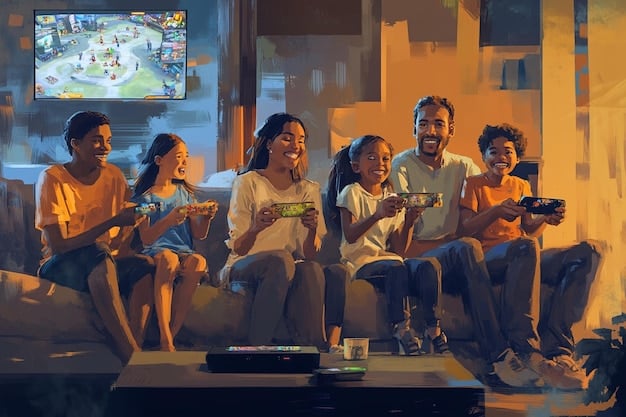Diversity & Inclusion in US Games: Shaping Future Representation

The increasing focus on diversity and inclusion in game development is poised to significantly impact the representation of characters, stories, and developers within US-made games, fostering a more equitable and reflective industry.
The gaming industry, a global powerhouse of entertainment, is undergoing a significant transformation. The question of how will the increasing focus on diversity and inclusion in game development impact representation in US-made games? is becoming more pressing than ever. This shift promises to reshape the landscape of US-made games, influencing everything from character design to narrative themes.
The Growing Demand for Inclusive Games
The gaming community is increasingly vocal about the need for games that reflect the diversity of the real world. Gamers want to see characters they can identify with, stories that resonate with their experiences, and development teams that understand and respect their perspectives. This demand is driving significant changes within the industry.
Rising Consumer Expectations
Consumers are becoming more discerning in their choices. They are looking beyond gameplay mechanics and graphics to assess the values and messages conveyed by a game. Games that lack diversity or perpetuate harmful stereotypes are facing increased scrutiny and criticism.
- Authenticity Matters: Players value authentic representation over tokenism.
- Community Feedback: Developers are paying closer attention to feedback from diverse communities.
- Social Media Influence: Social media amplifies voices and drives conversations about inclusivity.
This heightened awareness is forcing developers to reconsider their approach to game design and storytelling.
Legal and Ethical Considerations
Beyond consumer demand, legal and ethical considerations are playing a crucial role in promoting diversity and inclusion in game development. Companies are recognizing the importance of creating a workplace that is welcoming and inclusive for all employees.
Equal Opportunity Policies
Many game development companies are implementing equal opportunity policies to ensure fair hiring practices and promote diversity within their teams. These policies aim to eliminate bias and create a level playing field for all applicants.

A diverse workforce is essential for creating games that resonate with a diverse audience.
Impact on Character Design
One of the most visible impacts of the focus on diversity and inclusion is the changing face of characters in US-made games. Developers are moving away from stereotypical portrayals and embracing more nuanced and authentic representations.
Beyond Stereotypes
Characters are no longer confined to narrow archetypes. Games are featuring characters with diverse backgrounds, experiences, and identities.
- Realistic Portrayals: Characters are depicted with depth and complexity, avoiding harmful stereotypes.
- Cultural Sensitivity: Developers are consulting with cultural experts to ensure accurate and respectful representation.
- Representation of Disabilities: Games are increasingly including characters with disabilities, portrayed as capable and multifaceted individuals.
This shift is enriching the gaming experience and making games more relatable to a wider audience.
Influence on Narrative Themes
Diversity and inclusion are not only affecting character design but also shaping the narrative themes explored in US-made games. Games are tackling complex social issues and presenting stories from diverse perspectives.
Exploring Social Issues
Games are becoming a platform for exploring a range of social issues, including race, gender, sexuality, and social justice.
Stories that celebrate diversity and challenge prejudice are gaining popularity.
By engaging with these themes, games are sparking important conversations and promoting empathy.

Changes in Game Development Teams
The push for diversity and inclusion extends beyond the content of games to the composition of the development teams themselves. Companies are recognizing that diverse teams lead to more innovative and inclusive games.
Creating Inclusive Work Environments
Efforts are being made to create work environments that are welcoming and supportive for individuals from all backgrounds. This includes implementing diversity training programs, creating employee resource groups, and fostering a culture of respect and inclusivity.
- Mentorship Programs: Offering mentorship opportunities to underrepresented groups.
- Flexible Work Arrangements: Providing flexible work arrangements to accommodate diverse needs.
- Addressing Bias: Actively addressing and mitigating unconscious bias in hiring and promotion processes.
A diverse and inclusive team is better equipped to create games that resonate with a diverse audience.
Challenges and Opportunities
While progress is being made, challenges remain in achieving true diversity and inclusion in game development. Overcoming these challenges presents significant opportunities for the industry to grow and evolve.
Addressing Representation Issues
One of the biggest challenges is ensuring that representation is not tokenistic or superficial. Developers need to engage with diverse communities and consult with experts to create authentic and meaningful portrayals.
Additionally, there is a need to address systemic biases that may be hindering the progress of underrepresented groups in the industry.
| Key Point | Brief Description |
|---|---|
| 🎮 Authentic Representation | Moving beyond stereotypes in character design and narratives. |
| 🤝 Inclusive Teams | Diverse development teams create more inclusive games. |
| 📣 Consumer Demand | Rising expectations for diverse and inclusive gaming experiences. |
| ⚖️ Ethical Policies | Legal and ethical considerations driving inclusive practices. |
Frequently Asked Questions
▼
Diversity in game narratives leads to richer stories that reflect a wider range of human experiences, promoting empathy and understanding among players.
▼
Inclusion ensures that diverse perspectives shape game design, leading to more innovative and representative content that resonates with a broader audience.
▼
Consumers increasingly expect to see authentic representation of diverse characters and stories, moving beyond stereotypes and tokenism in gaming content.
▼
Developers can consult with cultural experts, engage with diverse communities, and conduct thorough research to ensure accurate and respectful portrayals in their games.
▼
Legal policies, such as equal opportunity employment, enforce fair hiring practices, ensuring diverse representation in game development companies and their products.
Conclusion
The increasing focus on diversity and inclusion is transforming the US game development scene, leading to games that are more representative, engaging, and socially conscious. While challenges remain, the industry is making significant strides towards creating a more equitable and inclusive gaming experience for all. The shift promises to reshape the landscape of US-made games, influencing everything from character design to narrative themes.